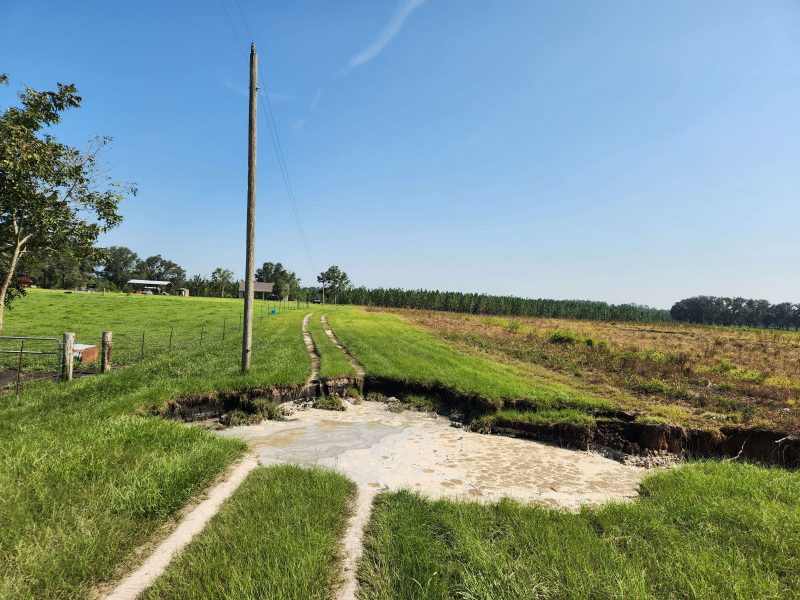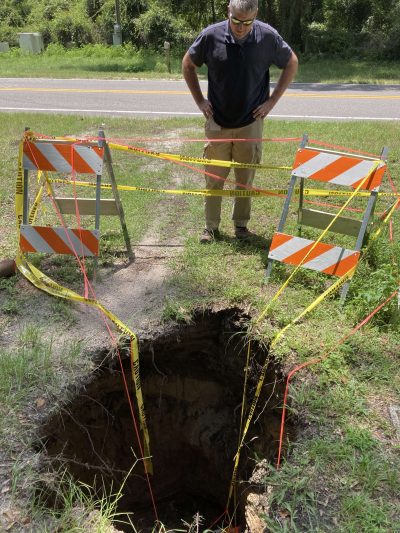
This sinkhole opened up after Hurricane Debby made landfall in Florida’s Big Bend region on August 5, 2024. Image source: Suwannee River Water Management District.
Sinkholes are a relatively common feature of our landscape in Florida. They form when surface sediments collapse into cavities found within limestone bedrock, resulting in a depression or hole at the surface. Cavities are created in the bedrock when slightly acidic groundwater dissolves the limestone over time. When a cavity becomes too large to support the overlying sediment, the ground collapses into it. Sinkholes can also form when surface sediments settle down into cavities over long periods of time (there is no collapse) creating a bowl-shaped depression.
Limestone underlies our entire state, but there are regions where the risk of sinkholes is higher, such as where the limestone is closer to the surface. Although cavities and voids are a feature of carbonate rocks like limestone, few collapse and directly impact roads or buildings.
–
Where can you find help if you have a sinkhole on your property?
The Florida Geological Survey (FGS), has a Sinkhole Helpline (850 245-2118) and an extensive online Sinkhole FAQ to answer residents’ questions. You can speak with someone for guidance about what to do (you may not need to do anything) and they can help clarify information found in the FAQs.
You can also contact your Water Management District for guidance. In our region, that would either be the Northwest Florida Water Management District (850 539-5999) if you live in Escambia County to western Jefferson County, or the Suwannee River Water Management District (386 362-1001) if you live in North Central Florida, including eastern Jefferson County (District Boundary Map).
Here are a few important tips to keep in mind, summarized from the Sinkhole FAQ. Much more detailed information is found on the website, but you can call the sinkhole helpline or your Water Management District for further clarification on steps to take.
- Call 911 or your local law enforcement agency if there is any risk of physical harm.
_
- For sinkholes under or near structures: Stay out of your house if you suspect the hole is causing or could cause any impact to the structure. In some counties, local government agencies, the sheriff’s office or emergency management office may help when a home is endangered.
– - Contact your property insurance to see if they cover assessment and repair of damage caused to structures. It’s recommended to safely mark the hole’s boundaries and document its size by taking photographs and monitoring changes. Keep children and pets away.
– - For sinkholes in your yard, small holes can often be filled with clean sand or soil.
– - On large properties, sinkholes that are not actively developing and are not affecting a structure can usually be left alone. If there’s a risk of people or animals falling in, fence or cordon off the sinkhole, or you can typically fill the hole with clayey sand (which is preferred) although clean fill material can also be used. Don’t throw anything into a sinkhole or use any fill material that can decompose or leach toxins into groundwater.
– - Although no permit is usually needed to fill a new sinkhole, old sinkholes, sinkholes in wetland areas or those that may change water flow or add to groundwater pollution if filled may need an environmental resources permit (ERP) before filling. Contact your Water Management District or FDEP District Office for guidance.
– - Keep in mind that other factors besides sinkholes can cause settling on the land surface. These include decomposing stumps, compressed or decomposing garbage and other debris, collapsed or broken sewer pipes and septic systems, soil that wasn’t compacted properly after excavation was completed, among others.
–
Additional resources listed by FGS include:
For insurance questions contact the Dept. of Financial Services – Division of Consumer Services
For information about your rights as a tenant or landlord review the Department of Agriculture & Consumer Services’ Landlord and Tenet Law
- Testing Your Irrigation Water: A Key Step for Managing Crops and Equipment - November 21, 2025
- What to Do if Sinkholes Open on Your Property - November 15, 2024
- Crop Farmers Implementing BMPs in the Chipola River Basin - May 24, 2024

